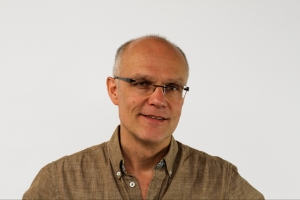Justin Mcguinness
Associate Professor, Interim Program Director, MA in Global Communications
- Department: Communication, Media and Culture
- Graduate Program(s): Global Communications
See Courses >>

Born in England, Justin McGuinness joined The American University of Paris in 2001. After a first degree in Oriental Studies (Arabic and Islamic studies) at Cambridge, he headed for North Africa where he taught at the University of Tunis and worked free-lance as a conference interpreter and translator. Eventually, on completion of a PhD focusing on representations of power, poverty and the city (University of Newcastle Upon Tyne, Department of Architecture, Landscape and Planning), he turned to travel writing before moving to France to take up his current academic post. By dint of his experience of acquiring languages and moving between cultures, jobs and locales, he is much interested in the mechanics of different discursive worlds.
McGuinness is essentially a cultural geographer with strong interests in architectural history, the construction of place, and policy implementation. In his current work, he considers urban change within the perspectives offered by theories of neoliberal urbanism and globalization. He is concerned with the processes, practices and discourses at work in the city – hence recent work on changes in land and property use in the Maghrebi cities of Fès and Tunis. (He has also worked on urban cultural events and spiritual tourism). Currently, McGuinness is studying the transformation of the river-front district at the heart of historic Fès. In another project for 2017, he is returning to an area he first studied in the early 1990s, namely conservation planning in the médina of Tunis. The context, authoritarian twenty years ago, is now essentially democratic. What does this new political situation mean for planning professionals, urban conservationists and the users of historic neighbourhoods concerned, whether residents, workers or visitors.
Education/Degrees
- PhD, University of Newcastle Upon Tyne
- MA, University of Durham
- BA, University of Cambridge
News
Professor McGuinness gave a paper entitled ‘Gentrification in Tunis, stalled or incipient? The impact of transitional rule on urban change in a historic Arab city’, at the 2013 annual conference of the Royal Geographical Society in London (27 – 30 August).
Publications
- “Mithly.net: An Alternative Digital Discourse from Morocco, 2010-2011” in Tarik Sabry and
Layal Ftouni, Arab Subcultures: Transformations in Theory and Practice (Library of Modern Middle
East Studies) London: I.B. Tauris (2016) - 'La Villa du Zodiac, une certaine idée du modernisme méditerranéen dans les années 1930', with Zoubeïr Mouhli, in Archibat (issue 23, spring 2011)
- "'De mon âme à ton âme' / Le Festival de Fès des musiques sacrées du monde et ses discours (2003-2007)" in Maghreb et sciences sociales 2009-2010 (Thème 1, 27-52)
- 'Viva Laljdérie' in IBLA, No. 199 (2007), pp. 77-82
- 'Errances vers un Orient imaginaire? Les polymigrants de la Médina de Fès (2000-2005)' in IBLA, No. 198 (2006), pp. 179-208
- 'Tunisian Dynasticism' in The Court Historian, Vol. 10, 2 (December 2005), p. 193
- 'A Textual Enactment of Community: On Discourse Analysis, the News Media and a Social Housing Project in Tunisia in the 1990s'. The Journal of North African Studies, Vol.10, No.1 (March 2005) pp.1-18
- 'La Médina de Tunis: paysage et texture urbains, espace et changement' in Revue de l’Institut de Belles Lettres Arabes, 2002, 1, nº189, (65ème année), pp.71-96
- 'Neighbourhood notes: texture and streetscape in the Médina of Tunis'. Journal of North African Studies, vol. 5, summer 2001, pp.97-120
- 'Political context and professional ideologies: French urban conservation planning transferred to the Médina of Tunis'. Journal of North African Studies, 1/6 winter 1997
- 'Political Context and Professional Ideologies' in The Journal of North African Studies, Vol.2, No. 2 (Autumn 1997), pp. 34-56
- Joint editor of collection of conference papers entitled L’intégration de l’héritage (Tunis: ASM, 1994).
Encyclopaedia entry
- 2016 “LGBT Activism in North Africa” in Nancy A. Naples (ed) Wiley Blackwell Encyclopaedia of
Gender and Sexuality Studies, Oxford: Wiley Blackwell, DOI - 10.1002/9781118663219.wbegss625.
Conferences & Lectures
- 2016. ‘Murs de terre en déshérence. Sens, sensibilités et architecture vernaculaire dans le Haouz de Marrakech’, paper given at the Université François-Rabelais, Tours at the launch meeting of the research project on Patrimondialisation, managed by the CITERES (research centre on CItés, TERritoires, Environnement et Sociétés), 20 April 2016.
- 2015. ‘Selves transformed? Fès, Morocco’s geo-pious centre as university classroom’, paper given at seminar Le tourisme religieux dans le monde arabe : entre pratiques pélérines et enjeux patrimoniaux, Institut français du Proche Orient, Amman, 18-19 November 2016.
- 2015. ‘Uneven urban development in Morocco in the light Neil Smith’s work: revanchism, protest and two case studies from Marrakech and Fès (1995 to 2015)’, paper given with Elsa Coslado at the international conference Capitalismo global y procesos de regeneracion urbana. Homenaje a Neil Smith, Barcelona, 14-16 September, 2015
- 2014. ‘From Madinat el Bahja to Happy Guéliz: gentrification, worlding and self-representation in Marrakech’, paper given at the workshop Beyond the straw men organized by the MENARG, Faculty of Political and Social Sciences, University of Ghent, 12 – 13 November 2014.
- 2014. ‘Traditionaliser l’espace public à Fès : realisations récentes dans la Médina’, paper given at the seminar L’architecture de tourisme au Maghreb, quelle relecture du patrimoine local ?, Institut pour la recherche sur le Maghreb contemporain, Tunis, 19 – 20 September, 2014.
Research Areas
General areas
* Urban studies
* Built heritage preservation
* Communications history
* Ethnographic methods
* Discourse analysis.
Specific areas
* Maghreb (North Africa) and in particular Morocco and Tunisia
* Traditional urbanism / architectural conservation
* Arab media
* Sacred sites
